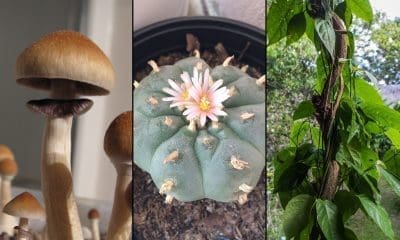Politics
Hawaii Marijuana Decriminalization Will Take Effect, Governor Says

Hawaii Gov. David Ige (D), who has at times expressed serious concerns about marijuana policy reform, announced that he will allow a legislature-passed bill to decriminalize small amounts of cannabis to go into effect.
Ige didn’t include the decrim proposal in a list of legislation he intends to veto by Monday’s deadline.
Lawmakers sent the bill, which punishes possession of three grams of marijuana with a $130 fine instead of jail time, to the governor’s desk in April. As originally introduced, it covered greater amounts of marijuana in line with decriminalization policies in other states, but was watered down as it advanced through the legislative process.
Under current law, possessing cannabis is a petty misdemeanor that carries up to a $1,000 fine.
In a press conference to discuss his veto list, Ige called the marijuana legislation “a very tough call” and said went “go back and forth” on the issue before deciding to let the bill take effect.
The governor said he would have preferred if the decriminalization proposal included provisions aimed at “young people who we would want to get into substance abuse or other kinds of programs to help them deal with drug use.”
In the end, he said, he decided “it would be best not to veto that.”
Watch Ige discuss his decision not to veto marijuana decriminalization, about 23:35 into the video below:
Some legislative leaders have expressed interest in considering legislation to legalize and regulate marijuana.
Asked by a reporter about the possibility of broader cannabis reforms in Hawaii, Ige said that the state “can benefit from not being at the head of the table.”
“We continue to learn from other states about the problems that they see with recreational marijuana,” he said, echoing concerns he has about legalization and noting that he’s been discussing the possible reform with governors from some western states that have already enacted it. “We would be smart to engage and recognize what’s happening in other states, acknowledge the challenges and problems it has raised.”
Nikos Leverenz, board president for the Drug Policy Forum of Hawaii, told Marijuana Moment that Ige should be “commended” for not vetoing the bill.
“It’s also encouraging that he’s having ongoing conversations with other governors from states that have legalized adult-use cannabis,” he said. “Hawai’i can indeed learn a great deal from other states, including the enactment of social equity measures to ensure broad local participation by women, underrepresented minorities, and those harmed by the drug war.”
Also on Monday, Ige announced that he intends to veto a bill allowing medical cannabis patients to transport their medicine between islands.
“Marijuana, including medical cannabis, remains illegal under federal law. Both the airspace and certain areas of water fall within the exclusive jurisdiction of the federal government,” he wrote. “This bill may lead travelers, acting in reliance on this provision, to erroneously believe they are immune from federal prosecution.”
Another proposal on the governor’s veto list would establish a hemp licensing program.
“There are concerns that this bill creates a licensing structure that cannot be enforced, will not meet USDA requirements for an approved industrial hemp program, and creates practical problems in the enforcement of existing medical cannabis,” he reasoned.
Finally, Ige plans to veto a bill to scale back the use of asset forfeiture, which is often used against people accused of drug crimes, with the governor calling the practice “an effective and critical law enforcement tool that prevents the economic benefits of committing a crime from outweighing consequential criminal penalties and punishment.”
Texas Governor Signs Bill To Expand State’s Medical Marijuana Program
















